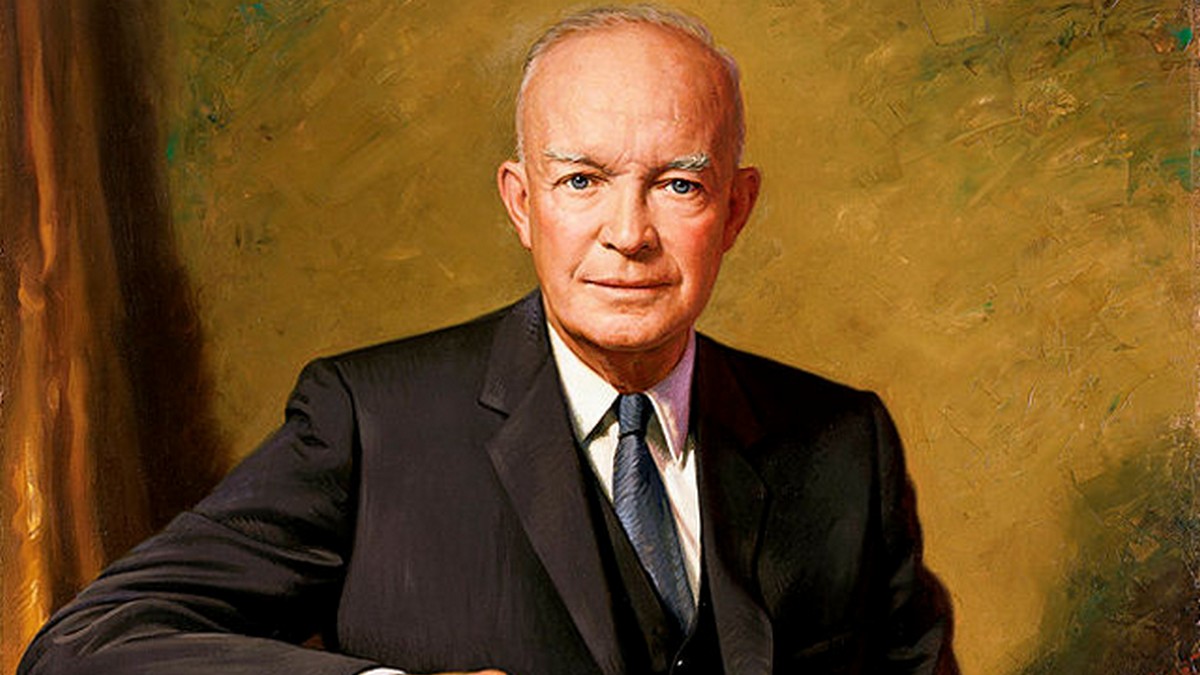Editor’s Note: This is a series of profiles taking a closer look at US presidents ahead of the 2024 presidential election between Donald Trump and Kamala Harris.
Though many US presidents have had military experience, none served at a higher level than Dwight D Eisenhower.
Eisenhower, after all, was not only the Chief of Staff of the US Army, but also Supreme Commander of the Allied forces in western Europe during World War II.
Eisenhower also fought in World War I – a distinction he shares only with his predecessor Harry S Truman.
Eisenhower also probably gave the most famous exit address ever made by a US president, when he in January 1961 warned of the ‘military-industrial’ complex.
He is also in another select class – one of the few commanders-in-chief with a US carrier named after him.
Let’s take a look at the 34th President of the United States.
Early years
Eisenhower was born on October 14, 1890 in Texas’ Denison.
His parents were David Jacob and Ida Elizabeth Eisenhower.
Eisenhower’s parents didn’t have much growing up other than their morals and their religion – which they sought to inculcate in the boy.
As a child, Eisenhower was given the nickname ‘Ike’.
It was a moniker he would make famous around the world.
Eisenhower attended high school and then immediately enrolled in West Point – the famed military institution that seemingly churned out impressive military men by the dozens including its most famous one – former president Ulysses S Grant.
Impact Shorts
More ShortsBut never a good student, Eisenhower fared poorly academically at West Point too.
Eisenhower was then commissioned to San Antonio.
It was here that he met his wife-to-be Mamie Geneva Doud.
Eisenhower, who ran a tank training center in World War I, was given a Distinguished Service Medal for his efforts.
He was also sent to the Panama Canal Zone after the war ended.
Eisenhower swiftly climbed the ranks of the military – becoming aide to US Army Chief of Staff General Douglas MacArthur.
By 1941, World War II was on – and he had become a full colonel.
By then, George C Marshall had taken over as US Army Chief of Staff – and found Eisenhower indispensable to the war effort.
Marshall would trust Eisenhower to formulate the strategy for the Allied invasion of Europe.
By 1943, Eisenhower had ascended to supreme commander of the Allied forces in Europe.
It was he who ordered the invasion of Normandy – the biggest amphibious attack in history.
After Germany surrendered, Eisenhower would become a five-star general.
He wanted to retire, but then president Truman had other plans – he insisted Eisenhower take over as US Army Chief of Staff.
Eisenhower finally left the military and became president of Columbia University.
He also wrote a bestselling book Crusade in Europe.
Political career
As a former military man, and an extremely distinguished one at that, Eisenhower had no shortage of supporters eager to put his name forward for president.
This included then New York governor Thomas E Dewey, the former Republican nominee for president who came up short against Truman.
Eisenhower finally took the plunge and won the Republican nomination on the first ballot. He selected Richard M Nixon as his running mate.
His Democratic opponent would be then Illinois governor Adlai Stevenson and his running mate John Sparkman.
Eisenhower used his popularity with the general public to great effect.
His ‘I like Ike’ slogan swept the nation.
Eisenhower and Nixon would decimate the opposing ticket – winning a massive 442 votes in the Electoral College compared to a paltry 89.
He was sworn into office on January 20, 1953.
Time in office
By the time Eisenhower occupied the Oval Office, the Cold War had begun.
The Korean war between the communist North and pro-Western South had also broken out.
Eisenhower, perhaps aided by the death of Stalin and his hints about considering deploying nuclear weapons, negotiated a truce in the Korean War.
However, his proposal to the Russians to exchange blueprints of military establishments and the ‘open skies’ policy was met with silence.
Eisenhower wasn’t giving up though.
He hosted Nikita Khrushchev to Camp David to try and reach a détente.
But fate conspired to get in the way – the Russians downing a US spy plane put an end to any such hopes.
Eisenhower also famously sent federal troops in to force Arkansas to comply with the United States Supreme Court order on desegregation.
Legacy
Eisenhower achieved much during his lifetime.
But while he was derided by some in his day, especially for not doing more on the issue of race, the passage of time has only enhanced his reputation.
However, it is his last speech as US president – dubbed the ‘military-industrial’ address – that remains most relevant to this day.
“In the councils of government, we must guard against the acquisition of unwarranted influence, whether sought or unsought, by the military-industrial complex. The potential for the disastrous rise of misplaced power exists and will persist,” Eisenhower warned.
With many parts of the world still at war, Eisenhower’s warning continues to echo through the ages.
)